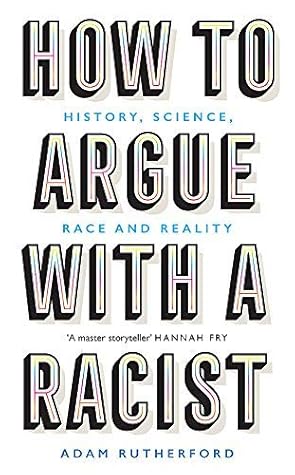More on this book
Community
Kindle Notes & Highlights
Read between
May 27 - June 6, 2020
In the 1972 paper ‘The Apportionment of Human Diversity’, Lewontin found that the vast majority (85 per cent) of genetic differences were within classical races, not between them. Only 6 per cent of differences segregated by race.
The idea that we were ancestrally dark skinned before diversifying as we crept around the globe is now known to be incorrect. Not only were we diverse in our skin colour long before the dispersal from Africa, we were diverse in our skin colour before we were our own species.
When all you’ve ever known is privilege, equality feels like oppression.
The logic to arguments about who is entitled to be in a geographical region is often missing or at least ahistorical, as no people are ever static over long periods, and no power, culture or nation has ever been anything near permanent. Nevertheless, our sense of family and ancestry is powerful, even if it is painfully restricted.
In the study of genetics, we assume a generational time of twenty-five to thirty years, and in every generation back through time, the number of ancestors you have doubles. What this means is that over a 500-year period, you have 1,048,576 ancestors. By a thousand years ago, you have 1,099,511,627,776 – that is, over a trillion. This number is about ten times more people than have ever existed.
The last common ancestors of all people with longstanding European ancestries lived only 600 years ago – meaning that if we could draw a perfect complete family tree for all Europeans, at least one branch on each tree would pass through a single person who lived around 1400 CE.
Everyone alive today is descended from all of the global population in the fourteenth century BCE.
People have moved around the world throughout history and had sex wherever and whenever they could. Sometimes these are big moves in short times. More often people are largely static over a few generations, and that can feel like a geographical and cultural anchor. Nevertheless, every Nazi has Jewish ancestors. Every white supremacist has Middle Eastern ancestors. Every racist has African, Indian, Chinese, Native American, aboriginal Australian ancestors, as well as everyone else, and not just in the sense that humankind is an African species in deep prehistory, but at a minimum from classical
...more
It is therefore possible that you are genetically unrelated to people from whom you are actually descended as recently as the middle of the eighteenth century. This is a point that further undermines the appropriation of genetics as a means of asserting membership of a tribe, race or other identity.
As Jonathan Swift said in 1721: ‘Reasoning will never make a Man correct an ill Opinion, which by Reasoning he never acquired.’
You are not your genes, and you are not your ancestors. Most of your ancestry is lost, and can never be recovered. We can be clear on this with absolute certainty: you are descended from multitudes, from all around the world, from people you think you know, and from more you know nothing about. You will have no meaningful genetic link to many of them. These are the facts of biology.
Are fast twitch muscles cells more common in sprinters? Yes. Are they more common in West African people? Possibly. Are they more common in African Americans? Maybe a bit. Are they unique to African people? No. Does the RR allele of ACTN3 or the II allele of ACE make you run faster? No: in elite athletes, they appear to be necessary but not sufficient for athletic success. The difference in regionally mediated success is culture. The utter dominance of Finnish long-distance runners in the first half of the twentieth century ended because the culture of running dissolved. The current dominance
...more
Even with all of that genetic advantage in place, we have to resolve again that having the right genes is necessary but not nearly sufficient to account for the dominance of any group of athletes in any sport.
As well as entertainment, sport is a celebration of the extremes of human capabilities. To reduce it to mere unearned biology is racism, whether conscious or not. In return for their pursuit of greatness, we owe elite athletes more deserving praise than auspicious ancestry.
It behoves us all to confront racism wherever we find it, especially when it is covert or normalised in stereotypes and myth, and science is a weapon in that contest. The academic and political activist Angela Davis said that ‘in a racist society it is not enough to be non-racist, we must be anti-racist.’
Race is real because we perceive it. Racism is real because we enact it. Neither race nor racism has foundations in science. It is our duty to contest the warping of scientific research, especially if it is being used to justify prejudice. If you are a racist, then you are asking for a fight. But science is my ally, not yours, and your fight is not just with me, but with reality.


